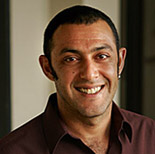
Biographies
 Daniel J. Levitin is associate professor of psychology at McGill University, where he holds a James McGill Chair and the Bell Chair in the Psychology of Electronic Communication. He is an Associate member of School of Computer Science, Faculty of Music, and Faculty of Education at McGill. He earned his B.A. in Cognitive Science from Stanford University, his Ph.D. in Cognitive Psychology from the University of Oregon and completed post-doctoral training at Stanford University Medical School.
Daniel J. Levitin is associate professor of psychology at McGill University, where he holds a James McGill Chair and the Bell Chair in the Psychology of Electronic Communication. He is an Associate member of School of Computer Science, Faculty of Music, and Faculty of Education at McGill. He earned his B.A. in Cognitive Science from Stanford University, his Ph.D. in Cognitive Psychology from the University of Oregon and completed post-doctoral training at Stanford University Medical School.
As a musician (tenor saxophone, guitar and bass), he has performed with Mel Tormé, Nancy Wilson, and members of the Steve Miller Band and Santana. Levitin served as Vice President of Artists & Repertoire at 415/Columbia Records (now Sony Records) from 1984- 1988, and as its President in 1989. After 415 was sold to Sony, Levitin ran a successful production and consulting company whose clients included every major American record label and several film companies. He has produced or consulted on albums by artists including Stevie Wonder, Steely Dan, and Chris Isaak. In 1999, Levitin helped to form one of the first internet music distribution companies, MoodLogic, which was sold to the AMG group in May 2006. He also served as a consultant for the U.S. Navy Underwater Weapons Station, Apple Computer, Sirius Satellite Radio, and Philips Electronics. In 2000, Levitin became a founding member of McGill University's Center for Interdisciplinary Research in Music Media and Technology.
Levitin has published more than 40 peer-reviewed scientific articles, and over 300 popular articles about music and music technology in commercial and trade magazines including Billboard, Electronic Musician, Mix, and Grammy. For his technical and marketing contributions to the recording industry, Levitin has been awarded 12 gold or platinum records, and two of his projects received Oscar nominations. He currently directs the McGill Laboratory for the Study of Music Cognition, Perception and Expertise. He is the author of the Maclean's Top 10 bestselling book This Is Your Brain on Music: The Science of a Human Obsession (Penguin, 2006).
 Jeffrey S. Mogil was born in Toronto, Ontario, in 1966. He received a B.Sc. (Honours) in Psychology from the University of Toronto in 1988, and a Ph.D. in Neuroscience from UCLA in 1993. After a postdoctoral fellowship in Portland, OR from 1993 to 1996, he joined the faculty of the Dept. of Psychology at the University of Illinois at Urbana-Champaign. He moved to McGill University in 2001, and is currently the E.P. Taylor Professor of Pain Studies (a Chair previously occupied by Dr. Ronald Melzack) and the Canada Research Chair in the Genetics of Pain (Tier I).
Jeffrey S. Mogil was born in Toronto, Ontario, in 1966. He received a B.Sc. (Honours) in Psychology from the University of Toronto in 1988, and a Ph.D. in Neuroscience from UCLA in 1993. After a postdoctoral fellowship in Portland, OR from 1993 to 1996, he joined the faculty of the Dept. of Psychology at the University of Illinois at Urbana-Champaign. He moved to McGill University in 2001, and is currently the E.P. Taylor Professor of Pain Studies (a Chair previously occupied by Dr. Ronald Melzack) and the Canada Research Chair in the Genetics of Pain (Tier I).
Dr. Mogil has made seminal contributions to the field of pain genetics and is the author of all major reviews of the subject, including an edited book, The Genetics of Pain (IASP Press, 2004). He is also a recognized authority in the fields of sex differences in pain and analgesia, and nociceptive testing in the laboratory mouse. Dr. Mogil is the author of over 120 articles and book chapters since 1992, and has given over 110 invited lectures in that same period. He holds or has held funding from the U.S. National Institutes of Health, Canada Foundation for Innovation, Genome Canada, Neuroscience Canada and the pharmaceutical/biotech industry.
He is the recipient of numerous awards, including the Neal E. Miller New Investigator Award from the Academy of Behavioral Medicine Research (1998), the John C. Liebeskind Early Career Scholar Award from the American Pain Society (1998), the Patrick D. Wall Young Investigator Award from the International Association for the Study of Pain (2002) and the Early Career Award from the Canadian Pain Society (2004). His work has been featured numerous times in newspapers, magazines and television around the world, including The New York Times, Time, Newsweek, The Economist, CBC, BBC, National Public Radio, National Geographic and ABC News. His finding of sex-specific analgesia mechanisms was voted one of the Top 50 Science Stories of 1994 by Discover magazine, and findings regarding the pain and analgesic sensitivity of redheads was voted one of The New York Times Magazine’s Ideas of the Year in 2005. Currently, Dr. Mogil is shifting the focus of the laboratory to study the effects of social communication of pain among mice, and towards the development of more clinically relevant animal models of pain.
 Karim Nader is an Associate Professor and William Dawson Chair in the Department of Psychology at McGill University. He received his Ph.D. in Neuroscience for work performed in Professor van der Kooy’s lab, at the University of Toronto in 1996. The following three years Dr. Nader accepted a Post-Doctoral Fellowship at New York University's Center for Neural Sciences, and he worked in collaboration with Dr. J. E. LeDoux with whom he continues to collaborate on various research projects. From 1999 to 2001 he held the positions of Adjunct Professor at the Department of Psychology at NYU and subsequently as Research Assistant Professor at the Center for Neural Science, NYU. Dr. Nader became Assistant Professor in the Department of Psychology, McGill University, Montreal, Canada, in 2001 and since 2004 holds a tenured position as Associate Professor.
Karim Nader is an Associate Professor and William Dawson Chair in the Department of Psychology at McGill University. He received his Ph.D. in Neuroscience for work performed in Professor van der Kooy’s lab, at the University of Toronto in 1996. The following three years Dr. Nader accepted a Post-Doctoral Fellowship at New York University's Center for Neural Sciences, and he worked in collaboration with Dr. J. E. LeDoux with whom he continues to collaborate on various research projects. From 1999 to 2001 he held the positions of Adjunct Professor at the Department of Psychology at NYU and subsequently as Research Assistant Professor at the Center for Neural Science, NYU. Dr. Nader became Assistant Professor in the Department of Psychology, McGill University, Montreal, Canada, in 2001 and since 2004 holds a tenured position as Associate Professor.
Nader is best known for his work rediscovering memory reconsolidation. He has grants and awards from the Volkswagen Foundation, Human Frontiers of Science, NSERC, Canadian Foundation for Innovation, Canadian Institute for Health Research. He is an Alfred P. Sloan Fellow, EJLB Foundation Scholar, William Dawson Chair and CIHR Young Investigator and was recently named to the Caldwell Partners/Globe&Mail's Report on Business Top 40 under 40. He has given over 50 international invited lectures in the last 4 year. His lab is dedicated to studying issues in memory processing in the brain with emphasis on reconsolidation.
 Joe Schwarcz is Director of McGill University’s Office for Science and Society. He is one of Canada’s foremost educators and is well known for his informative and entertaining public lectures on topics ranging from the chemistry of love to the science of aging. Dr. Schwarcz has received numerous awards for teaching chemistry and for interpreting science for the public. He hosts The Dr. Joe Show on CJAD radio in Montreal and CFRB in Toronto, and has appeared hundreds of times on The Discovery Channel, CTV, CBC, TV Ontario and Global Television. Dr. Schwarcz also writes a newspaper column entitled "The Right Chemistry" and has authored six best-sellers, Radar, Hula Hoops and Playful Pigs, The Genie in the Bottle, That's The Way The Cookie Crumbles, Dr. Joe And What You Didn’t Know, The Fly In The Ointment and Let Them Eat Flax.
Joe Schwarcz is Director of McGill University’s Office for Science and Society. He is one of Canada’s foremost educators and is well known for his informative and entertaining public lectures on topics ranging from the chemistry of love to the science of aging. Dr. Schwarcz has received numerous awards for teaching chemistry and for interpreting science for the public. He hosts The Dr. Joe Show on CJAD radio in Montreal and CFRB in Toronto, and has appeared hundreds of times on The Discovery Channel, CTV, CBC, TV Ontario and Global Television. Dr. Schwarcz also writes a newspaper column entitled "The Right Chemistry" and has authored six best-sellers, Radar, Hula Hoops and Playful Pigs, The Genie in the Bottle, That's The Way The Cookie Crumbles, Dr. Joe And What You Didn’t Know, The Fly In The Ointment and Let Them Eat Flax.
 Barbara B. Sherwin received her Ph.D. in Clinical Psychology from Concordia University in 1983. Presently, she is Full Professor in the Department of Psychology, Faculty of Science and Full Professor, Department of Obstetrics and Gynecology, Faculty of Medicine, at McGill University. She is also Co-Director of the Menopause Clinic, Centre for Reproduction, McGill University Health Centre.
Barbara B. Sherwin received her Ph.D. in Clinical Psychology from Concordia University in 1983. Presently, she is Full Professor in the Department of Psychology, Faculty of Science and Full Professor, Department of Obstetrics and Gynecology, Faculty of Medicine, at McGill University. She is also Co-Director of the Menopause Clinic, Centre for Reproduction, McGill University Health Centre.
Dr. Sherwin’s research is concerned with the investigation of the effects of the sex hormones on aspects of brain function, particularly, cognitive function, in aging women and men. In 2000, Dr. Sherwin was the recipient of the five-year Medical Research Council of Canada Distinguished Scientist Award and, that same year, she received a James McGill Professorship at McGill University. In 2004, Dr. Sherwin was awarded the NAMS/Proctor & Gamble Pharmaceuticals Leadership Award in Androgen Research for her lifetime contributions to our understanding of the role of androgen in postmenopausal women. Dr. Sherwin is on the Editorial Board of four medical and scientific journals and has published over 140 original research papers and book chapters. She has been an Advisory Board member of the Women’s Health Initiative Memory Study (NIA/NIH) since 1996. In 2007, Dr. Sherwin was the recipient of the D.O. Hebb Award for distinguished contributions to Psychology as a science by the Canadian Psychological Association.
 Paul Wiseman was an NSERC fellow and Sivertz Scholarship recipient at University of Western Ontario and graduated with his Ph.D. in Chemistry in 1995 (graduate supervisor: Professor Nils O. Petersen, Dept. of Chemistry, UWO). Following graduate school, Wiseman was a Japan Society for the Promotion of Science (JSPS) postdoctoral fellow in the lab of Professor Akihiro Kusumi at the University of Tokyo and Nagoya University from 1996-1998. He next became a LaJolla Interfaces in Science (LJIS) postdoctoral fellow and later assistant project scientist in the Wilson-Squier Laboratory at the Dept. of Chemistry jointly appointed to Professor Mark Ellisman’s lab in neuroscience at the University of California, San Diego.
Paul Wiseman was an NSERC fellow and Sivertz Scholarship recipient at University of Western Ontario and graduated with his Ph.D. in Chemistry in 1995 (graduate supervisor: Professor Nils O. Petersen, Dept. of Chemistry, UWO). Following graduate school, Wiseman was a Japan Society for the Promotion of Science (JSPS) postdoctoral fellow in the lab of Professor Akihiro Kusumi at the University of Tokyo and Nagoya University from 1996-1998. He next became a LaJolla Interfaces in Science (LJIS) postdoctoral fellow and later assistant project scientist in the Wilson-Squier Laboratory at the Dept. of Chemistry jointly appointed to Professor Mark Ellisman’s lab in neuroscience at the University of California, San Diego.
Dr. Wiseman is currently an assistant professor in both the Department of Chemistry and the Department of Physics at McGill University. His current research involves combining various forms of nonlinear optical microscopy with correlation spectroscopy for studies of transport dynamics of macromolecules and their interactions in living cells and neurons. He was awarded the "Young Fluorescence Investigator of the Year" award in 2005 by the Biophysical Society.